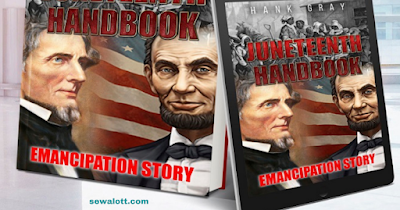
The Juneteenth Handbook was put together by me to share my very own personal experience about attending my first Juneteenth celebration, and to share some interesting information about the Juneteenth celebration collected during my research stage for this book's companion video/DVD A Time to be Remembered, A Juneteenth Story. My handbook also offers a brief history of the Juneteenth celebration that includes many of the people, places, and things associated with the oldest celebration of the end of slavery in this nation. Much of this history I did not know before starting my Juneteenth knowledge-gathering journey.
My other motivation behind this handbook was the joy of knowing that some of these interesting Juneteenth snippets, cut from my video production because of time considerations, would not be lost to the editing room floor. The fact that Juneteenth is currently a federal holiday is amazing to me and was one of the driving forces for me creating the video, and the handbook, thinking that if enough Americans became aware of the truly historic significance of the Juneteenth celebration it might help tip the scale all the way over to; make Juneteenth a national holiday.
In my retired life, I realize that I not only love history, but I also love uncovering hidden history. So far, it's been history hidden from me, I'm sure if my college days had bent more toward African American history rather than electronics, the history I am learning about today would have shown itself to me much earlier. Still, many of the things I have learned about slavery and the Juneteenth celebration these days I wish I had known when I was in school.
The truth of the matter is that the Juneteenth celebration, which culminated with the passage of the 13th, 14th, and 15th Amendments did something the July 4th, 1776 celebration did not do. The Juneteenth celebration made the United States a more perfect union because, on June 19th, 1865, all Americans, black and white, were finally entitled to equal protection under the laws of this nation, something that was not true on July 4th, 1776.
The thing to remember is that Jubilee Day, Freedom Day, Emancipation Day, just some of the other names for the Juneteenth Celebration, is an important part of American History and is considered the longest-running African American, and end of slavery celebration in the U.S. North Dakoda, and Hawaii used to be part of the last three states in the union with no prevision to celebrate Juneteenth. Each of those states has since approved legislation to honor Juneteenth as a State Holiday leaving South Dakoda the only no Juneteenth celebration holdout.


No comments:
Post a Comment